Places, subjects, or plaques matching "William Shakespeare"
1 subject matching "William Shakespeare"
23 plaques matching "William Shakespeare"
Texas Historical Marker #03511
Mrs. John L. Morris (Marjorie). Originator, promoter of the glove of the great southwest, world's most nearly authentic replica of the globe theater in England made famous by the plays of William Shakespeare. Mrs. Morris was educated at north Texas state university and joined the English faculty at Odessa college. In 1961 the college named her "Teacher of the years". She was honored 1961 as an outstanding teacher in Texas college. She also founded the permian basin museum and area "writers' roundup" contest, both of which are sponsored by Odessa college. Outstanding women of Texas series, 1967. #3511
?, Odessa, TX, United States
John Fletcher (1579-1625) dramatist (collaborator first with Francis Beaumont then later with William Shakespeare) lived near here as a schoolboy.
The Deanery, Peterborough Cathedral, Peterborough, United Kingdom
Subjects
Mercury. Why, man, he doth bestride the world like a Colossus... - William Shakespeare. On this site in 1937, legendary American actor - writer - director - producer Orson Welles founded the Mercury Theatre with John Houseman. Here Welles directed groundbreaking productions of Julius Caesar, The Shoemaker's Holiday, Heartbreak House, and Danton's Death. Welles and The Mercury would go on to make history with The War of The Worlds broadcast and Citizen Kane. Astonishingly, he would accomplish all this by his 26th birthday.
110 West 41st Street, New York, NY, United States
Subjects
Upon this site formerly stood "The Bell" Carter Lane. From whence Richard Quiney wrote the letter to William Shakespeare dated 25th October 1598. This is the only letter extant addressed to Shakespeare and the original is preserved in the museum at his birthplace, Stratford Upon Avon. This tablet was placed upon the present building by leave of the Postmaster General 1899.
47 Carter Lane, London, United Kingdom
Subjects
William Shakespeare acted at The Theatre. Built by James Burbage. Plays by Shakespeare were performed here.
Curtain Road, London, United Kingdom
Subjects
On 10th March 1613 William Shakespeare purchased lodgings in the Blackfriars Gatehouse located near this site
5 St Andrew's Hill, London, United Kingdom
Subjects
The Shakespeare William Shakespeare was born twenty miles from Birmingham in Stratford-upon-Avon. Despite developing his career in London, Shakespeare's family remained in Stratford and he made frequent retreats to his home town. The Shakespeare stands close to the centre of Birmingham's famous Jewellery Quarter where in 1773 Parliament granted the Hallmarking Act and the Birmingham Assay Office was created. The success of the Assay Office was due to it's pioneering use of steam-powered presses for hallmarking. Today it is the largest in the world and is responsible for hallmarking over 12 million items a year.
The Shakespeare, Summer Row, Birmingham, United Kingdom
Subjects
The Birthplace of William Shakespeare (1564-1616) Entrance via The Visitors' Centre 40 metres
Shakespeare's Birthplace, Henley Street, Stratford-upon-Avon, United Kingdom
Subjects
William Shakespeare had lodgings near here in 1604, at the house of Christopher and Mary Mountjoy
St Olave's Churchyard, Noble Street EC2, London, United Kingdom
Subjects
Near this site stood The Curtain Theatre 1577-c.1627 Second English public playhouse Here William Shakespeare acted & plays by Shakespeare and Ben Jonson were performed.
18 Hewett Street, Hackney, London, United Kingdom
Subjects
King Edward VI School Shakespeare's School This Guildhall was built in 1420 and is the place where William Shakespeare was educated and first witnessed professional theatre. It served as the centre of civic life in Stratford for over 400 years and was the building in which Shakespeare's father, John, served as the town's bailiff. The Schoolroom on the upper floor is still in use today. As a state school we receive no government funding to support the upkeep of the Guildhall. The last major restoration of the building took place in 1891, and is now in urgent need of repair and conservation. We have made an application to the Heritage Lottery Fund but we need to raise in excess of £200,000 ourselves. We will then be able to open it to the public on a daily basis when lessons are not being taught.
King Edward VI School - Church Street, Stratford-upon-Avon, United Kingdom
Subjects
The Guildhall and Grammar School The Guildhall was built in 1417-20 as the headquarters of the Guild of the Holy Cross. In 1553 following the suppression of the Guild, the building was granted to the newly-formed Stratford Corporation by Edward VI. It served as the council's meeting place for the next 300 years, including the year 1568-9 when William Shakespeare's father, John, served as Balliff. The Guild's school, re-founded as The Kyng's Newe Scole in 1553, occupied part of the upper floor from the 1560s and it was here that William Shakespeare was eduated. In the late 1500s travelling players performed regularly in the Guildhall providing Shakespeare with his first experience of professional theatre. The Guildhall continues to be used for teaching by King Edward VI School.
The Guildhall and Grammar School - Church Street, Stratford-upon-Avon, United Kingdom
Subjects
The Shakespeare Centre Opened by the Shakespeare Birthplace Trust to commemorate the 400th anniversary of the birth of William Shakespeare 1564-1616 with the help of contributions from the lovers of many nations opened on 22 April 1964 by the Hon. Eugene R. Black of the American 1964 Shakespeare Committee. Visited by his Royal Highness The Duke of Edinburgh K.G. K.T. on the poet's birthday 23 April 1964 Laurence Williams Architect
The Shakespeare Centre, Henley Street, Stratford-upon-Avon, United Kingdom
Subjects
Shakespeare's New Place Built in 1483, New Place was the largest house in the borough of Stratford-upon-Avon. William Shakespeare bought New Place in 1597. It became his family home, and he lived here with his wife Anne and their daughters Susanna and Judith. Shakespeare died at New Place in April 1616. The house passed to his daughter Susanna Hall and, after her death in 1649, to his granddaughter Elizabeth Nash. Following Elizabeth's death in 1670, Sir John Clopton replaced it with a new house, completed in 1702. New Place was finally demolished by the Rev. Francis Gastrell in 1759. Since 1876 the site of Shakespeare's adult home has been preserved as a garden and cared for by the Shakespeare Birthplace Trust. Following extensive archaeological investigations the gardens at New Place were re-presented and opened in 2016 with an exhibition centre located in the adjoining Nash's House.
Shakespeare's New Place, Chapel Street, Stratford-upon-Avon, United Kingdom
Subjects
Easton Time Signs Trail #1j
John William Henry Wall 1855 - 1915 Novelist and Local Historian, "The Shoemaker Poet". A Pioneer of the Bristol and District Co-op Movement, founded at 38 Croydon St and opened at 22 Houlton Street in 1884. He set up the "Shakespeare Boot Mart" at 15 Croydon Street in 1887. A Bootcutter, on low income, who with Co-operative and Socialist Principles, fought for the rights of Working-Class people.
Croydon House, Croydon Street, Easton, Bristol, United Kingdom
Subjects
The Shrieve's House and Barn The oldest lived-in house in Stratford (First recorded building on this site is 1196) An inn during the 16th century run by William Rogers who it is said was the inspiration for Shakespeare's much-loved character of Falstaff. Residence of John Woolmer in the 17th century, the first mayor of Stratford. Residence of Edward Gibbs in the 19th century who was responsible for renovating the Swan and Maidenhead in Henley Street into the Shakespeare Birthplace, who was known as The 'Shakespeare' Architect. Also documented as The most haunted building in England Now a privately run museum.
Falstaff Experience - Sheep Street, Stratford-upon-Avon, United Kingdom
Subjects
The Lord Chamberlain's Men (Shakespeare's company) performed in the courtyard of The White Hart through this archway in the 1690's. "All the world's a stage"
Russell Square, Marlborough, United Kingdom
Subjects
The George Inn. It is known that the George Inn existed in the late 16th Century although the present building dates from 1677. Both Shakespeare and Dickens knew the hospitality of the inn which has continued right up to the present day. The inn is now owned by The National Trust
73 Borough High Street, Southwark, SE1, London, United Kingdom
Subjects
Site of "White Hart Inn" immortalized by Shakespeare in "Henry VI" & Dickens in "Pickwick Papers"
White Hart Yard, Borough High Street, Southwark, SE1, London, United Kingdom
Subjects
Here stood the Globe Playhouse of Shakespeare 1598 - 1613
Park Street, SE1, London, United Kingdom
Subjects
Until 1957 here stood The Booth Hall mentioned in 1230, it served as Guildhall, Assize Court, Theatre, Concert Hall and finally cinema. Here Shakespeare probably acted, M.P's were elected and George Whitefield preached.
Shire Hall - Westgate Street, Gloucester, United Kingdom
Subjects
The Windmill says Welcome friends! I've been an inn for more than 350 years. While Will Shakespeare was writing his immortal plays some of his fellow townsmen were enjoying their favourite drink here. They must have enjoyed his company, too, for he lived only a hundred yards away and the home of his daughter, Susanna Hall, was round the corner in Old Town. The Welcome at the Windmill is as cordial now as it was in the poet's day.
The Windmill Inn, Church Street, Stratford-upon-Avon, United Kingdom
Subjects
This Court contains an early Baptist Chapel the home of the Baptist Church whose records dates from 1655. The building has furniture of that period. The Burial Ground has the Tombs of the Shakespeare & other noted Families.
Church Street, Tewkesbury, United Kingdom





.jpg?width=250)


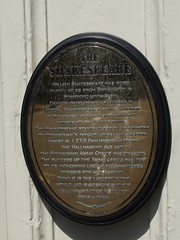
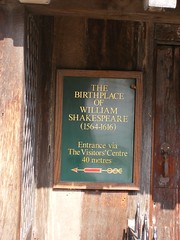


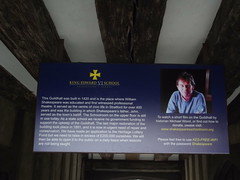
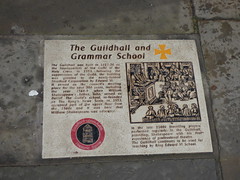


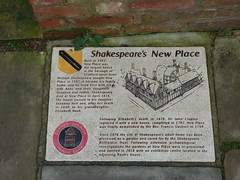


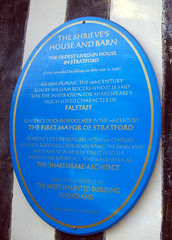

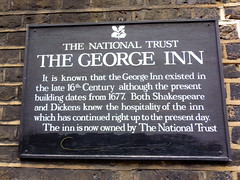

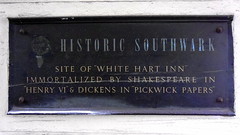

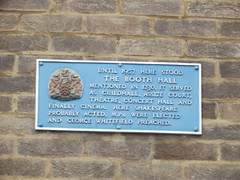
.jpg?width=250)

